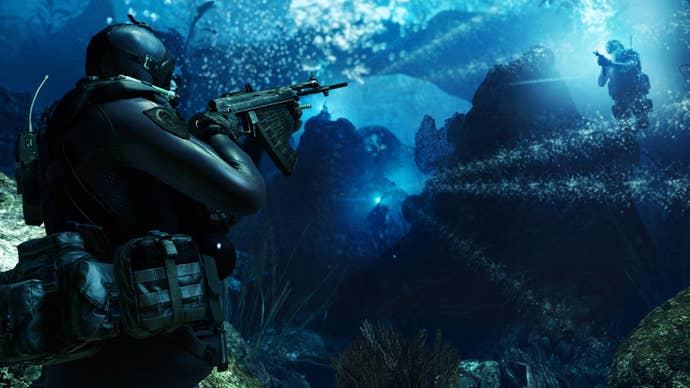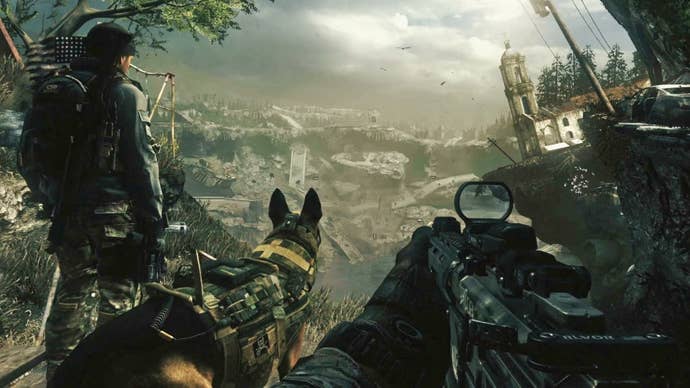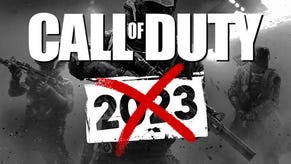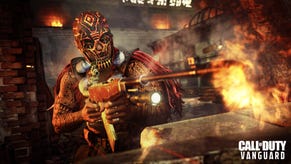Call of Duty and the Invisible Hand
Is linear design an inextricable part of the Call of Duty experience?
This article first appeared on USgamer, a partner publication of VG247. Some content, such as this article, has been migrated to VG247 for posterity after USgamer's closure - but it has not been edited or further vetted by the VG247 team.
I've never been able to get into the Call of the Duty games. That doesn't make me unusual by any means; in fact, anecdotally speaking, it seems like the people who frequent sites like USgamer are more likely to criticize Call of Duty than to enjoy it (or at least admit to enjoying it). It's the Madden NFL of shooters, a game whose stratospheric sales come mostly from people who own a game console for a couple of titles and couldn't care less about BioShock or Dead Space (let alone the likes of Monster Hunter or Rogue Legacy).
However, most of the disparagement I see directed toward Call of Duty by gaming enthusiasts focuses on its tone and story: The Michael Bay-esque glorification of military power, the ooh-rah jargon, the increasingly ludicrous lengths to which the writers will go to recapture the shock of Modern Warfare's nuclear detonation scene and its agonizing aftermath. They're understandable criticisms, but they're not my complaint; if I stopped playing games whose stories I didn't like, my collection would mostly revolve around Tetris and Yasumi Matsuno projects.
Rather, I take exception to the series' "invisible hand." Sadly, I don't mean Adam Smith's theory of the invisible hand that ensures free market exist in a self-correcting state -- though how wonderfully appropriate would it be to go up against a macroeconomic theory of capitalism as a final boss in a Call of Duty? -- but rather the hand that's constantly pressed against the small of your on-screen avatar's back, endlessly shoving him down what amounts to a linear hallway. Sometimes, the hand takes the form of a curiously closed-off pathway that conveniently leads you to your objective through the chaos of combat with no means to veer off course. Sometimes it's a guy shouting at you to do this, go there, kill that. Sometimes it's that same guy doing nearly all the work for you, mowing down an entire enemy squad and leaving you to mop up a straggler or two before shouting at you to advance to the next point in the scenario's inexorable tube of combat.

I've simply never been a fan of that style of shooter design. Maybe it's because I cut my teeth on the FPS genre back when they were called "Doom clones" and consisted of cutout sprites running around in primitive 2D engines, but the "roller coaster ride" style of FPS design -- as codified by Half-Life 2 -- has never clicked with me. Call of Duty takes that approach to its extreme limit, and when I spoke with Ghosts executive producer Mark Rubin a few weeks ago, I asked point-blank if the invisible hand of Call of Duty is an intrinsic element of the franchise. Is there a way to create a cinematic shooter without stuffing the player into a box and constantly saying "do this, go there"?
?"It's a balance," Rubin said. "We want to tell a great story. We want you to be involved. There are a lot of things that we don't do, but a lot of other single-player campaigns do.
"For instance, we generally don't try to force you to look at a cutscene. If there's something happening, we don't just turn the camera and make you look and you're like, 'Oh, I'll just put the controller down. I have to watch this cutscene. Time to eat my popcorn.' We try to make the player always feel like they're still part of that world they're in. They're not being forced to see those things.
"Now, we do still want to guide the player through the story and have a story happening. We don't want to go into the open-world idea of, 'I can do whatever I want. I can break my story. I can make my story uninteresting.' It's a weird, fine balance. We want to ensure that the player gets the story and the experience that we're trying to craft for them, but not have that 'Press Y to watch the cutscene!' feel, or put the player in a position where they can make the wrong decision and get stuck or get lost or otherwise not feel like they're part of the story.
"One of the first things that can happen when you get away from what we try to plan for you is that you realize you're in a video game. 'Let's go see if the toilets flush!' Flush the toilets. 'Oh, look, the toilets flush!' That's cool. I did it in Duke Nukem every time I saw a toilet. But it pulls you out of the story. You remember that you're in a game. For us, it's always about making sure that the player feels like they're in a movie, that they're in this cinematic experience. I really think that kind of stuff can pull you away from there."
While Rubin's response made it clear the upcoming Ghosts isn't likely to fall over itself to accommodate my personal tastes, it does throw the very different philosophies behind the series' multiplayer and campaign aspects into sharp relief. Multiplayer is meant to be as "video game"-like as possible, with a fussy HUD and constant notifications to stick-and-carrot you into an obsessive long-term commitment. The campaign, on the other hand, is meant to sit at the opposite end of the spectrum. It seeks to hide its nature, wrapping itself in the conventions of Hollywood. It's meant to be as immersive as possible, eschewing any minor distraction that could break the illusion. A friction-free movie that you yourself play (kind of).

The problem with that philosophy, I think, is that different people expect different things from games. Personally, I find it far more distracting to have my movements locked down and my freedom negated than to be able to go off-script. My instinct with games is to poke around in the corners and have a look at the world my character inhabits, and when I'm forcibly prevented from doing that (or worse, the game plays itself while I'm exploring some non-critical scenery, as often happens to me in Call of Duty), I'm much more likely to be taken out of the experience.
But I also realize I'm probably unusual in that regard. For the majority of gamers -- especially the ones who don't do a lot of gaming -- the adrenal thrill of constant motion and rushing breathlessly from sortie to sortie is precisely the rush they want from the medium. The series' sales numbers prove Infinity Ward and Treyarch are doing something right. At the same time, Rubin's comments demonstrate the difficulty of designing a game for a mass audience: No matter who you try to appeal to, someone's going to be left out in the cold.
In Call of Duty's case, it looks like the one in the cold will be me. But that's OK. As long as I can count on the occasional shooter like Deus Ex -- a game where you earn rewards for exploring a room off the critical path rather than an earful of grief from your master sergeant -- Call of Duty and I can agree to disagree.



_ziVC6Lw.jpg?width=291&height=164&fit=crop&quality=80&format=jpg&auto=webp)

.jpg?width=291&height=164&fit=crop&quality=80&format=jpg&auto=webp)


